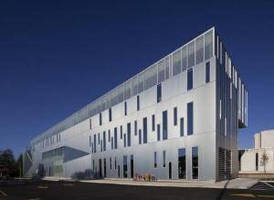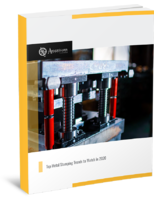A Rhapsody in Reynobond®: Oberlin College's New Jazz Building Clad in Alcoa Architectural Aluminum Panels
Share:

Aims to be the First LEED® Gold Certified Music Conservatory in the U.S.
NEW YORK - The Bertram and Judith Kohl Building, a virtual rhapsody in Alcoa's Reynobond aluminum composite material (ACM), has applied to become the first Leadership in Energy and Environmental Design (LEED) Gold certified music conservatory in the U.S.
The $24 million, three-story, 37,000-square-foot structure is the new home for the Jazz Studies Program at the Oberlin Conservatory of Music in Oberlin, Ohio. It is composed of three basic elements: an aluminum exterior, which wraps and encloses the programmatic elements; openings created by cutting and peeling away the aluminum composite material shell; and an abundance of daylight streaming into the building.
"From the beginning, we planned to clad the exterior in aluminum," said Lead Project Designer Jonathan C. Kurtz, AIA, of architectural firm Westlake Reed Leskosky, Cleveland. "It was a natural choice as the City of Oberlin sits above one of the largest deposits of bauxite ore in the country. And it was here, in 1886, that Charles Martin Hall, an Oberlin alumni and one of the founders of Alcoa, developed the cost-efficient process for obtaining aluminum from aluminum oxide that brought aluminum into widespread use."
Upon his success, Hall became a great benefactor to his alma mater. The Tappan Square property, on which the Kohl Building now stands, was just one of his generous gifts to the school.
Alcoa ACM panels in a brushed aluminum finish were used for the exterior walls and an anodic clear finish of the Reynobond material was used for the soffits of the building. Color was used to tie the new conservatory building to the existing campus designed in the 1960s by noted architect, Minoru Yamaski. Constructed of pre-cast concrete with a finish that's almost opalescent, the Yamaski buildings appear to transform under different light. To mimic the dynamics of the surface, Alcoa worked with cladding manufacturer Riverside Group of Windsor, Canada, to develop a custom finish for the Alcoa panel that also appears to transform as the light changes. The panel is further accented by the use of Brazilian Ipé hardwood siding at the entrance to add material texture. The wood, harvested from a sustainable forest, will weather naturally to a silver color that ties it to the aluminum and creates a coherent vernacular for the campus.
Sustainable Features
Targeting LEED Gold Certification, Westlake Reed Leskosky designed the building with the highest standards for environmental stewardship and sustainability, as well as stringent acoustical and technology requirements. The architectural firm recently submitted documentation to the U.S. Green Building Council (USGBC) to attain LEED certification, an internationally recognized benchmark for design, construction and operation of high-performance green buildings. The Kohl Building is now undergoing a thorough assessment for certification. If successful, it will be the first LEED Gold certified music conservatory in the U.S.
According to Kurtz, meeting LEED qualifications was interesting due to the unique requirements of a music building, which houses a large collection of Steinway pianos and other instruments, because of the need to maintain the right humidity levels for the instruments. Sustainable features include geothermal heating and cooling with radiant panels, energy-efficient systems and lighting, a green roof system and storm water run-off collection and filtration. Sustainably harvested materials were used throughout. The project was designed to achieve energy performance greater than 40% higher than the ASHRAE 90.1 baseline energy standard for buildings. Also important: the tight integration of acoustic, energy, comfort and air quality considerations, and a geothermal radiant system, which reduces the need for duct work in the walls, floors and ceilings that compromise acoustics.
The Bertram and Judith Kohl Building houses a world-class recording studio; flexible rehearsal and performance spaces, teaching studios, practice rooms, a glass-enclosed social hub, an archive of the largest Jazz recording collection in the US, as well as, collections of rare instruments and jazz photographs from the 1950s.
About Alcoa Architectural Product
Alcoa Architectural Products offers a complete range of exterior and interior cladding and corporate identity solutions. Architects and specifiers find they have greater control over the finished appearance of projects when working with the Alcoa family of products, which includes the revolutionary new EcoClean® coating, the Reynobond® Face Fastened Solution, the Colorweld®500 finish with the industry's first 30-year warranty, and innovative materials such as the Reynobond Design Line, Anodized Reynobond and Reynobond with KEVLAR®, in addition to classic Reynobond ACM, Reynobond Natural Metal and Reynolux® profiled panels and flat sheet. Alcoa Architectural Products is a business unit of Alcoa, the world's leading producer of aluminum products.
About Alcoa
Alcoa (NYSE:AA) is the world's leading producer of primary and fabricated aluminum, as well as the world's largest miner of bauxite and refiner of alumina. In addition to inventing the modern-day aluminum industry, Alcoa innovation has been behind major milestones in the aerospace, automotive, packaging, building and construction, commercial transportation, consumer electronics and industrial markets over the past 120 years. Among the solutions Alcoa markets are flat-rolled products, hard alloy extrusions, and forgings, as well as Alcoa® wheels, fastening systems, precision and investment castings, and building systems in addition to its expertise in other light metals such as titanium and nickel-based super alloys. Sustainability is an integral part of Alcoa's operating practices and the product design and engineering it provides to customers. Alcoa has been a member of the Dow Jones Sustainability Index for nine consecutive years and approximately 75 percent of all of the aluminum ever produced since 1888 is still in active use today. Alcoa employs approximately 59,000 people in 31 countries across the world. More information can be found at www.alcoa.com.




